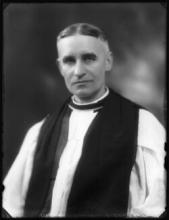Ernest William Barnes was born in Altrincham, Cheshire, England, on 1 April 1874. His early education was at King Edward’s School in Birmingham where he won a scholarship from Trinity College, Cambridge in 1893. He obtained first class honours in 1897 and is renowned as one of Cambridge’s most gifted mathematicians. Barnes became a fellow of Trinity College after winning the Smith’s Prize in 1898, and in 1902 he was appointed lecturer, receiving his doctorate (D.Sc.) in 1906, becoming tutor in 1908. The following year he was made a Fellow of the Royal Society (FRS).
In 1902 Barnes was ordained deacon by the Bishop of London. He was Junior Dean in Trinity College from 1906 to 1908 and in 1915, when he left Cambridge (and his career as a professional mathematician), he became Master of the Temple in London. In 1918 he was made Canonry of Westminster, before ascension to Bishop of Birmingham in 1924. His time as bishop was marred with controversy and his courageous defences of the truth, as he saw it, at times conceived as unorthodox, often spared little consideration for his interlocutors. His book The Rise of Christianity included attacks on traditional Christian doctrines like the Virgin Birth and Christ's bodily resurrection, and it was suggested he resign. His blunt dismissal of these suggestions only further isolated him somewhat from his peers.
Barnes was invited to Aberdeen as Gifford Lecturer (1927–1929) to deliver lectures under the title of ‘Scientific Theory and Religion’. The lectures were published in 1933 and sought to bring Christian doctrines together with the possibility of life on other planets. The magnitude of the universe, accompanied with some basic observations on biological development within it, makes speculation about the possibility of intelligent life in distant galaxies reasonable. Barnes believed that the Creation was made precisely for the higher forms of consciousness.
Barnes resigned in 1953 due to illness. Despite his controversial tendencies he was known as a man of great kindness and esteemed for his courageousness. Barnes married and had two sons. He died in his home in Sussex, May 1953, at the age of 79.
His works include: Religion and Science (1923); Freedom and Authority (1924); Should Such a Faith Offend?: Sermons and Addresses (1928); Man (1932); Scientific Theory and Religion (1933); A Christian Approach to Peace (1945); Patriotism and Christianity (1945); The Rise of Christianity (1947); and Religion Amid Turmoil (1949).



